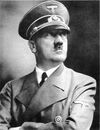The Chancellor of Germany is the head of government of Germany. In German politics the Chancellor is equivalent to that of a Prime Minister in many other countries.
The office of Chancellor has a long history, stemming back to the Holy Roman Empire. The title was at times used in several states of German-speaking Europe. The modern office of Chancellor was established with the North German Confederation, of which Otto von Bismarck became Chancellor in 1867. After the Unification of Germany in 1871, the office became known in German as Reichskanzler, although it continued to be referred to as Chancellor in English.
With the collapse of the empire in 1918, a republic, known as the Weimar Republic, was formed, with a presidential office replacing the emperor as the German head of state. The Chancellor continued on as head of government. While the intent was that the presidency would share power with the chancellor and the Reichstag, the instability of the Republic resulted in a very powerful presidency, and a relatively weak chancellorship.
Adolf Hitler successfully attained the office of chancellor in 1933, and very quickly built up the office's power with the help of the Nazi dominated Reichstag. In 1934, shortly after the death of President Paul von Hindenburg, Hitler also assumed the office of head of state, changing the title from president to führer ("the leader"). Hitler functioned as both legal head of state and government for the duration of his reign, using the title "Führer und Reichskanzler" until 1942, when his title was changed to "Führer des Großdeutschen Reiches" ("Leader of the Greater German Realm").
The offices were split up again upon Hitler's suicide in April, 1945. Josef Goebbels very briefly succeeded Hitler as Chancellor. Goebbels also committed suicide, however, and it fell to Lutz Graf Schwerin von Krosigk as leading minister to surrender to the Allies. Admiral Karl Dönitz became the head of state as President of Germany, rather than führer.
With the split of Germany into West and East in 1949, two lines of heads of government emerged.
The 1949 constitution of West Germany gave the Chancellor greater powers than during the Weimar Republic, while diminishing the role of the President. This line of Chancellors was maintained after the reunification of Germany in 1990. Germany is today often referred to as a "chancellor democracy", reflecting the de facto role of the Chancellor as the country's chief executive.
In East Germany, the head of government was the Chairman of the Council of Ministers. As the Socialist Unity Party held the power in East Germany, the chairman was subordinate to the party leader.
Worldwar[]
Between 1934 and 1966, four men are known to have held the office of Führer and Chancellor of Germany.
| № |
Führer and Chancellor | Term | |
|---|---|---|---|
| 1 | Adolf Hitler | 
|
1934-195? |
| 2 | Heinrich Himmler | 
|
195?-1964 |
| 3 | Ernst Kaltenbrunner | 
|
1965 |
| 4 | Walter Dornberger | 
|
1965-1980(?) |
| 5-? | Successors unnamed | 1980(?)-2032 | |
Heinrich Himmler died unexpectedly in 1964, while in the midst of planning an attack on Race-controlled Poland. After a brief regency by the Committee of Eight, his successor Ernst Kaltenbrunner initiated Himmler's plan, leading to the brief and catastrophic Race-German War of 1965, which saw the death of Kaltenbrunner, and the ascension of the moderate Walter Dornberger, essentially the last senior official still alive.
Under Dornberger and his successors, Germany rebuilt in secret, away from the watchful eyes of the Race. By 2031, the Reich had become a space-faring power once again, and the Race respected it as a potential rival once more.
Other Chancellors[]
In addition to the above, Harry Turtledove has written several works of speculative fiction in which the chancellor plays a prominent role or, at a minimum, in which the incumbent chancellor is referenced.
Otto von Bismarck is the incumbent Chancellor in How Few Remain. His successors in the Southern Victory series are unnamed.
Adolf Hitler is or was the Chancellor of the Greater German Reich in the vast majority of Harry Turtledove works involving the Nazis and/or World War II, including "Cayos in the Stream", the Days of Infamy series, "The Eighth-Grade History Class Visits the Hebrew Home for the Aging", Joe Steele (both novel and short story), "The Last Article", The Man With the Iron Heart, "Must and Shall," "News From the Front", "The Phantom Tolbukhin", and "Zigeuner". The stories usually emphasize his position as Führer of the Greater German Reich over that of his position of chancellor.
In In the Presence of Mine Enemies, Hitler's successors use the title Führer des Grossdeutschen Reichs or simply, Führer, the title Hitler officially used from 1942 until 1945 in OTL. The title of Chancellor appears to have gone defunct, although the Führer still serves as head of both state and government.
Konrad Adenauer is the incumbent Chancellor in The Hot War series.
Historical Chancellors in Non-Chancellors Roles[]
Several historical Presidents have appeared in the works Harry Turtledove in a capacity other than as Chancellor.
Adolf Hitler does not become Chancellor during the Southern Victory series or in Curious Notions. He is not Chancellor at the end of the short work "Uncle Alf", and is not likely to achieve that office.
In OTL, Josef Goebbels was Chancellor for about a day after Hitler's suicide. He does not even get that brief tenure in In the Presence of Mine Enemies, "The Last Article", The War That Came Early or Worldwar series.
Konrad Adenauer is assassinated in 1946 in The Man With the Iron Heart before he can become Chancellor.